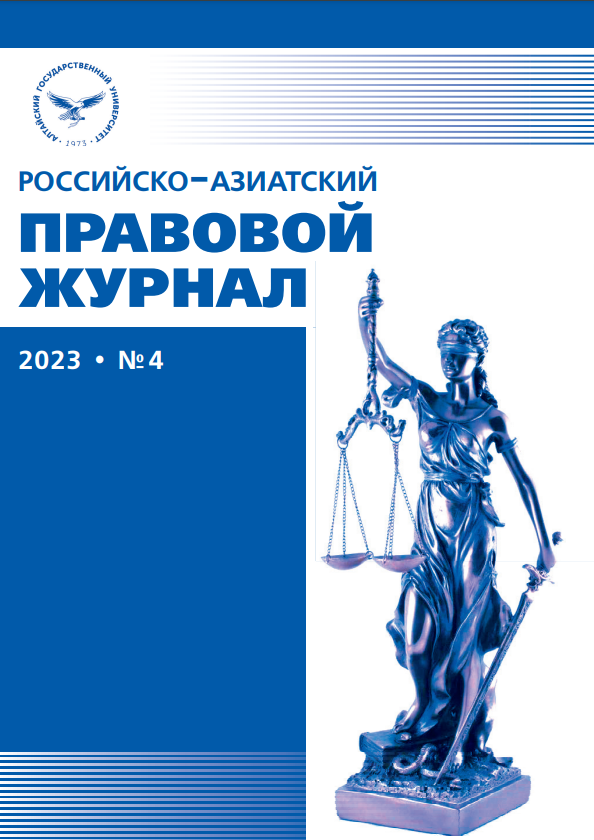ON THE SHORTCOMINGS OF NORM DESIGNS, PROVIDED FOR IN ARTICLES 2401 AND 241 OF THE CRIMINAL CODE OF THE RUSSIAN FEDERATION
УДК 343.544 ББК 67.408.132.23
Abstract
The article is devoted to the study of the construction of norms provided for in Articles 240.1 and 241of the Criminal Code of the Russian Federation for the purpose of compliance with the rules of legislativetechnology, which would make it possible to consolidate crime-forming characteristics in a way that ensurestheir uniform interpretation. A number of complaints about the designs of the studied compositions wererevealed. There is uncertainty in the reflection of signs of the age of the victim, which excludes the possibilityof a uniform interpretation in practice. Criticism is given to the legislator's use of plural constructions forsome characteristics. The establishment of the minimum threshold for a minor victim at sixteen years isidentified as an omission of the legislator and the need to establish criminal liability for receiving sexualservices of minors at a younger age in parts 2 and 3 of the studied norm is justified. The lack of a definitionof the concept of «prostitution» in the criminal law, which is used in the construction of a number of norms,has been criticized. The author, relying on the provisions of Art. 5 of the Criminal Code of the RussianFederation, came to the conclusion that the absence of an indication of knowledge about the age of minorsis not a defect in legislative technology.
Downloads
References
Копшева К.О. Проблема рассогласованности возраста потерпевшего при ненасильственных преступлениях против половой неприкосновенности и преступлениях против общественной нравственности с участием несовершеннолетних // Вопросы современной юриспруденции : сборник статей по материалам XLVIII Международной научно-практической конференции. Новосибирск, 2015. С. 57–61.
Гусарова М.В. Несовершеннолетние как особый объект преступлений против половой свободы и половой неприкосновенности личности // Вестник Казанского юридического института МВД России. 2017. №3 (29). С. 93 — –97.
Пантюхина И.В. Принуждение к занятию проституцией как особый вид понуждения к действиям сексуального характера // Правовое государство: теория и практика. 2019. №1. С. 118–128.
Пертянина О.А., Куликов Р.С. Получение сексуальных услуг несовершеннолетнего (ст. 2401 УК РФ): особенности юридической оценки // Вестник Казанского юридического института МВД России. 2018. №3. С. 390–394.
Шарапов Р.Д. Преступления против общественной нравственности : учебное пособие. СПб., 2022. 124 с.
Постановление Президиума Верховного Суда РФ от 10.10.2012 №122-П12 // СПС КонсультантПлюс.
Кассационное определение Верховного Суда РФ от 08.09.2011 №58-О11–37 // СПС КонсультантПлюс.
Приговор Приморского краевого суда от 26.09.2013 // СПС КонсультантПлюс.
Об отказе в принятии к рассмотрению жалобы гражданина Чавкина Сергея Николаевича на нарушение его конституционных прав статьей 171 Уголовного кодекса Российской Федерации: Определение Конституционного Суда РФ от 20.11.2003 №431-О // СПС КонсультантПлюс.
Об отказе в принятии к рассмотрению жалобы гражданина Куваева Леонида Александровича на нарушение его конституционных прав статьей 240 УК РФ: Определение Конституционного суда РФ от 23.06.2015 г. №1494-О // СПС КонсультантПлюс.
Кондратенко М.А., Тыдыкова Н.В. Проблема квалификации признаков составов в насильственных преступлениях // Российская юстиция. 2008. №1. С. 41–42.
Russian-Asian Law Journal is a golden publisher, as we allow self-archiving, but most importantly we are fully transparent about your rights.
Authors may present and discuss their findings ahead of publication: at scientific conferences, on preprint servers, in public databases, and in blogs, wikis, tweets, and other informal communication channels.
Russian-Asian Law Journal allows authors to deposit manuscripts (currently under review or those for intended submission) in non-commercial, pre-print servers such as ArXiv.
Authors who publish with this journal agree to the following terms:
- Authors retain copyright and grant the journal right of first publication with the work simultaneously licensed under a Creative Commons Attribution License that allows others to share the work with an acknowledgement of the work's authorship and initial publication in this journal.
- Authors are able to enter into separate, additional contractual arrangements for the non-exclusive distribution of the journal's published version of the work (e.g., post it to an institutional repository or publish it in a book), with an acknowledgement of its initial publication in this journal.
- Authors are permitted and encouraged to post their work online (e.g., in institutional repositories or on their website) prior to and during the submission process, as it can lead to productive exchanges, as well as earlier and greater citation of published work (See The Effect of Open Access).








